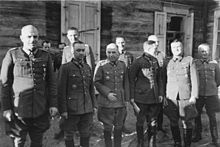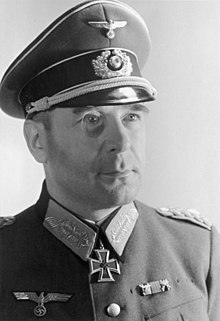Hans Krebs (officer)
Hans Krebs (born March 4, 1898 in Helmstedt , Duchy of Braunschweig , † May 1, 1945 in Berlin ) was a German officer , most recently a general of the infantry , and the last chief of the army in the Second World War .
Life
Krebs was the older of two children of the senior teacher Otto Krebs and his wife Adele, his sister was born a year later.
Up to the age of 15 the family lived in Helmstedt, where Krebs attended the Julianum high school. In 1913 the company moved to Goslar . There the apparently talented student (he skipped a class) went to the Ratsgymnasium .
First World War and the interwar period
After the outbreak of World War I, Krebs joined the Hanoverian Jäger Battalion No. 10 in Goslar as a volunteer on September 3, 1914 . As a flagjunker , he was transferred to the infantry regiment "Duke Friedrich Wilhelm von Braunschweig" (East Frisian) No. 78 on November 27th . On March 19, 1915, he and his regiment were deployed on the Western Front in France.
After the end of the war he was accepted into the Reichswehr in 1919 , from 1920 he served with interruptions in the 17th Infantry Regiment in Braunschweig . On April 29, 1920, Krebs married Ilse Wittkop. Daughter Anne-Marie was born in 1921, her sister Lieselotte in 1925.
Lieutenant Krebs (since April 1, 1925) completed general staff training during this time. In 1927 he served with the 6th (Prussian) Pioneer Battalion in Minden , in 1928 he was again in Braunschweig with the 17th Infantry Regiment. In 1930 Captain Krebs was transferred to the Reichswehr Ministry in Berlin, where he learned the Russian language. In 1931 he was assigned to the Foreign Armies Department and traveled to the Soviet Union and the Far East on their behalf . After a brief interlude as assistant to the military attaché in Moscow in 1933/34, he was company commander in the Gumbinnen infantry regiment until 1935 and then first general staff officer (Ia) of the 24th Infantry Division until 1937 . In October 1937, Krebs returned to Berlin as the first general staff officer of the 11th department of the general staff of the army (general staff training and regulations). He led this department for one year from October 1938 and was promoted to lieutenant colonel in this position .
Second World War
After completion of the invasion of Poland cancer was temporarily into the leader Reserve of the Army High Command transferred (OKH) to be appointed in December 1939 as chief of the General Staff of the VII. Corps. With this he took part in the western campaign in 1940 .


In October 1940 he was appointed first assistant to the military attaché in Moscow ( Ernst-August Köstring ) and promoted to colonel . He remained in this position until the German attack on the Soviet Union in June 1941. After working in the OKH, Krebs was appointed Chief of the General Staff of the 9th Army in January 1942 , which was deployed in the area of Army Group Center , and in this position for Promoted major general. After being reassigned to the Führerreserve, he was promoted to Chief of the General Staff of Army Group Center in March 1943 and a little later to Lieutenant General. Since the spring of that year he has been significantly involved in all operations in the central section of the Eastern Front . In several assessments of his work and personality, he was attested, among other things, a "firm National Socialist attitude".
In September 1944, Krebs was transferred to the Western Front as Chief of the General Staff of Army Group B (Field Marshal Walter Model ) . Here, among other things, he was involved in the planning of the company "Wacht am Rhein" ( Ardennes offensive ). On February 17, 1945, Krebs was commissioned to represent Walther Wenck as head of the operations department in the Army General Staff. He was slightly wounded in the Allied bombing raid on Wünsdorf on March 15, 1945. On March 29, Krebs was entrusted with the duties of the Chief of Staff of the Army and thus the successor to Heinz Guderian , whom Hitler had removed from the post the day before after a final argument. He was the last chief of staff before the German total surrender . On April 29, he signed Hitler's political will as a witness alongside Joseph Goebbels , Wilhelm Burgdorf and Martin Bormann .
The new Chancellor Goebbels and Party Minister Bormann gave Krebs the task of negotiating a separate peace with the Soviet Union. Krebs seemed ideally suited for the negotiations, as he had a good knowledge of Russian from his time in Moscow. On the morning of May 1, 1945, at around 2 a.m., the new chief of staff set out for his Soviet negotiating partner, Colonel General Tschuikow , the commander-in-chief of the 8th Soviet Guards Army . He reached him at around 3:50 am in the house on Schulenburgring 2 in Berlin-Tempelhof . After a while he was taken to a room with a large number of high-ranking Soviet officers whom he said he was authorized to contact for the purpose of negotiating a ceasefire . Furthermore, those present were the first to learn of Hitler's death. Krebs read out a letter from Goebbels in which the latter called for a ceasefire so that the new German government determined by Hitler in his political will could sit down. Krebs then handed over the cabinet list .
During the negotiations, Chuikov, surprised by the situation, called Marshal Zhukov to inform him about Hitler's suicide, among other things; the latter in turn immediately called Stalin in Moscow. However, the Soviet dictator refused a ceasefire with reference to the agreements between the Allies and called for Germany's unconditional surrender. At Krebs' request, the Red Army set up a direct telephone connection to the Reich Chancellery . Krebs communicated the demands of his negotiating partners to Goebbels by phone, which he refused without further ado. This made further negotiations pointless after about 12 hours. Krebs returned to the Führerbunker, where he met Hitler's secretary Martin Bormann , who accused him of failure. After most of the bunker inmates had fled the Führerbunker on the afternoon of May 1st and only Krebs and Hitler's adjutant Wilhelm Burgdorf remained in it, both of them committed suicide in the camp around 9:30 p.m.
Awards
- Iron Cross (1914) 2nd and 1st class
- Knight's Cross of the Royal House Order of Hohenzollern with swords
- Braunschweig War Merit Cross, 2nd and 1st class
- Friedrich-August-Kreuz 1st class
- Wound badge (1918) in black
- Clasp for the Iron Cross, 2nd and 1st class
- German cross in gold on January 26, 1942
-
Knight's Cross of the Iron Cross with oak leaves
- Knight's Cross on March 26, 1944
- Oak leaves on February 20, 1945 (749th award)
literature
- Dieter Lent: Cancer, Hans. In: Horst-Rüdiger Jarck, Günter Scheel (Hrsg.): Braunschweigisches Biographisches Lexikon. 19th and 20th centuries. Hannover 1996, ISBN 3-7752-5838-8 , p. 346 f.
- Braunschweiger Zeitung Spezial (04/2005) Hans Krebs. Hitler's most loyal general.
- Dermot Bradley (Ed.): The Generals of the Army 1921-1945. The military careers of the generals, as well as the doctors, veterinarians, intendants, judges and ministerial officials with the rank of general. Volume 7: Knabe-Luz. Biblio Verlag, Bissendorf 2004, ISBN 3-7648-2902-8 , pp. 187-189.
- Reinhard Bein : Hitler's Brunswick staff. DöringDruck, Braunschweig 2017, ISBN 978-3-925268-56-4 , pp. 120–125
Web links
Individual evidence
- ↑ a b c d e Ranking list of the German Imperial Army. ES Mittler & Sohn , Berlin, p. 157.
- ↑ a b Veit Scherzer : Knight's Cross bearer 1939–1945. The holders of the Iron Cross of the Army, Air Force, Navy, Waffen-SS, Volkssturm and armed forces allied with Germany according to the documents of the Federal Archives. 2nd Edition. Scherzers Militaer-Verlag, Ranis / Jena 2007, ISBN 978-3-938845-17-2 , p. 472.
| personal data | |
|---|---|
| SURNAME | Krebs, Hans |
| BRIEF DESCRIPTION | German officer, most recently General of the Infantry and Chief of Staff of the Army in World War II |
| DATE OF BIRTH | March 4, 1898 |
| PLACE OF BIRTH | Helmstedt |
| DATE OF DEATH | May 1, 1945 |
| Place of death | Berlin |

